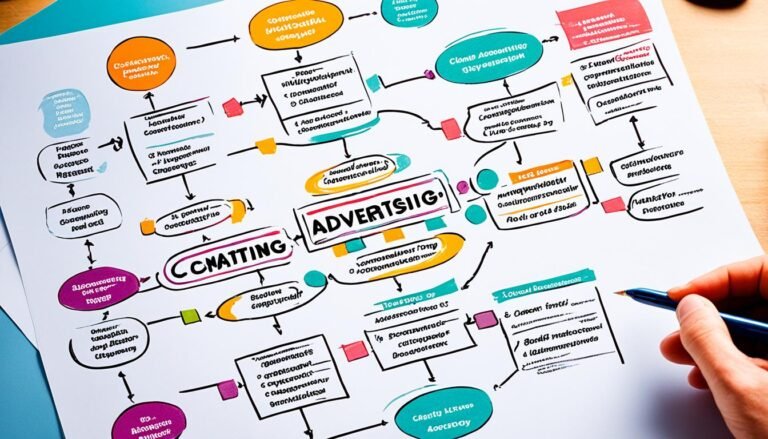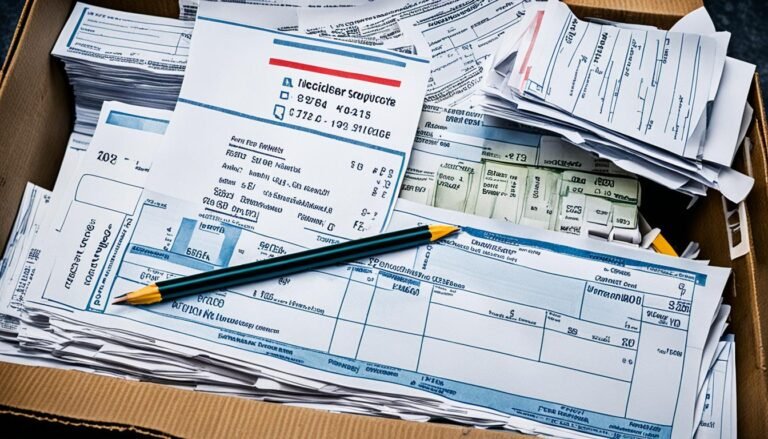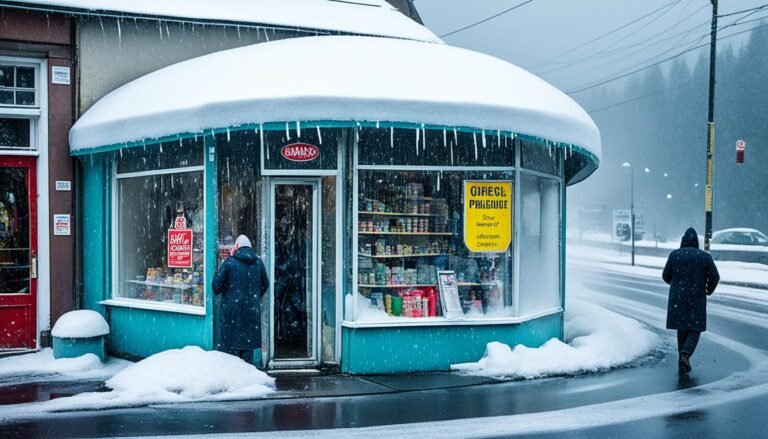Liability Insurance Basics for SME Owners
Did you know that small businesses are more likely to be sued than larger corporations? Yes, indeed. About 44% of small businesses in the U.S. face legal action each year. This highlights why it’s crucial for SME owners to have the right liability insurance coverage.
For small and medium-sized enterprise (SME) owners, knowing about liability insurance is vital. It protects your business. Whether you’re running the business alone or you’re part of a team, the right coverage can save you from huge financial losses.
This article will be your guide to liability insurance as an SME owner. We’ll cover the necessary insurances for your business, including property, liability, vehicles, and workers’ compensation. Plus, we’ll look at other types of coverage that might be crucial for your business. By the end, you’ll understand liability insurance well.
Key Takeaways:
- Liability insurance is crucial for SME owners because they face more lawsuits than big companies.
- It’s vital to know the basics of liability insurance to protect your business from risks and costs.
- Your business will need various insurances like property, liability, vehicle, and workers’ comp insurance.
- There might be other coverages, like umbrella policies, you need, depending on your business’s needs.
- A Businessowners Policy (BOP) can give you many coverages in one package at a lower cost.
Types of Insurance Your Business Needs
Protecting your business with the right insurance is key. There are various types of insurance every business should think about. This includes:
Property Insurance
Property insurance helps cover the things your business owns. This can be the building itself, the stock, and tools. It guards against loss or damage from things like fire, theft, and acts of nature.
Liability Insurance
Liability insurance safeguards your business if you face a lawsuit. It pays for damages, legal costs, and medical bills. It covers incidents where your business is at fault, like accidents or injuries from your products or services.
Business Vehicle Insurance
If you use vehicles in your business, you need insurance for them. This insurance helps if there’s an accident or injury. It also covers theft and damage to the vehicles.
Workers Compensation Insurance
For businesses with employees, workers compensation is a must. It covers medical care and lost wages for job-related injuries or illnesses. This stops employees from suing your business over these matters.
Having the right insurance keeps your business safe. Each insurance type offers specific protections. Let’s go through each one for a better understanding.
| Type of Insurance | Coverage |
|————————–|—————————————————–|
| Property Insurance | Protects physical assets (building, inventory, etc.) |
| Liability Insurance | Covers legal expenses and damages |
| Business Vehicle Insurance | Provides coverage for business vehicles |
| Workers Compensation Insurance | Ensures medical care and lost wages for employees |
Property Insurance
Property insurance is vital for keeping your business safe from risks and losses. It takes care of your building, inventory, and more against fire or theft damage.
With this insurance, rebuilding after a disaster won’t break the bank. It keeps you from worrying about your assets and lets you focus on running your business after the unexpected.
This type of insurance also covers extras like when your machinery breaks or there’s a power outage. It can save you from sudden repair or replacement costs.
Plus, it includes protection against water damage. This could be from burst pipes, leaks, or bad weather. It helps with fixing things or getting new equipment if they’re damaged by water.
Property insurance helps businesses recover from damage due to fire, theft, and more.
By having property insurance, you’re ready for any hiccups. If your business’s property gets damaged, your policy will help you recover financially. This lets you think about growing your business instead of the damage.
Benefits of Property Insurance:
- Protection against loss or damage to your business property.
- Financial security to repair or replace valuable equipment and inventory.
- Peace of mind knowing your physical assets are covered.
- Additional coverage for equipment breakdown and water damage.
Is Property Insurance Right for Your Business?
Any business can benefit from property insurance, big or small. Your business space, whether a store, office, or factory, is important. It should always be protected.
Imagine the cost if you lost your property or it needed big repairs. Property insurance acts as a safety net. It helps your business bounce back and run smoothly, even after tough times.
Talk to a skilled insurance agent to figure out what you need. They can help you choose the right coverage for your business. They’ll explain everything and make sure your policy fits your business’s needs.
Summary:
Property insurance is key for your business’s safety. It covers your space, inventory, and more against risks like fire and theft. You can also get protection for equipment breakdowns and water damage. Having property insurance means your business can survive and grow, no matter what challenges pop up.
Liability Insurance
Liability insurance is vital for small business owners. It protects them from lawsuits and claims. This includes damages if the business is found liable. It helps cover legal defense costs and medical fees from injuries.
Personal Injury Coverage
Personal injury coverage is key in liability insurance. It helps when someone is hurt due to an accident related to the business. This part pays for the injured party’s medical costs, reducing the business’s financial burden. All this is crucial against expensive legal claims for physical harm.
Product Liability Coverage
Product liability coverage is also essential. It’s for businesses selling products to the public. This part helps against claims of injury or damage by a faulty product. It safeguards SME owners, covering legal expenses and compensation due to product issues.
Coverage for Hazardous Environments
There’s also coverage for businesses in risky environments. They face more dangers and liabilities. This part offers more protection from accidents, injuries, and harm to the environment. It makes sure SME owners are prepared for legal issues and costs related to risky work.
SME owners must see how liability insurance protects them. It should include personal injury, product liability, and extra protection for high-risk zones. This insurance can keep their business safe for the long haul.
To understand different liability insurance types, check the table below:
| Type of Coverage | Description |
|---|---|
| Personal Injury Coverage | Provides protection against claims involving bodily harm to individuals |
| Product Liability Coverage | Protects against claims related to injuries or damage caused by defective products |
| Coverage for Hazardous Environments | Specifically designed for businesses operating in hazardous environments, providing additional protection against accidents, injuries, and environmental damage. |
Having liability insurance means SMEs can handle risks better. It guards the business against financial hits from legal issues and claims.
Image:
Business Vehicle Insurance
For SME owners using vehicles in their business, business vehicle insurance is key. It offers coverage for liability and physical damage from accidents. This protection is vital, whether it’s a delivery truck, a company car, or any vehicle for business use. It safeguards the business and its assets.
This insurance shields businesses in key ways. It covers liability costs like injury or property damage the business is at fault for. If someone is hurt or their property is damaged, this assists with their medical needs or repair costs. The business won’t face the full financial hit.
Also, it handles physical damage to the business’s vehicles. It helps with repair or replacement costs from accidents, theft, or vandalism. This support keeps the business moving forward without big financial setbacks.
SME owners should talk with an insurance pro about their specific needs. These experts can set the right coverage levels and customize a plan. They look at vehicle types, where they’re driven, and what the business does. This ensures the business is properly covered.
Getting commercial auto coverage shields SME owners from financial risks. Liability coverage protects against accident claims. Physical damage coverage gets vehicles back on the road fast. Together, they keep business vehicles – and business – running smoothly.
Insurance tip: Always consult with an insurance professional to ensure your business vehicle insurance provides the right coverage for your specific operations. They can help you understand the policy terms, limits, and any optional coverages that may be beneficial for your business.
Business Vehicle Insurance Coverage Summary
| Coverage Type | Description |
|---|---|
| Liability Coverage | Protection against bodily injury or property damage to third parties caused by a business vehicle |
| Physical Damage Coverage | Coverage for repairing or replacing business vehicles damaged in accidents, theft, or other covered events |
Comprehensive business vehicle insurance is a must for SME owners. It keeps their business, vehicles, and finances secure. With the right coverage, SME owners can breathe easy, knowing they’re protected.
Workers Compensation Insurance
For any company with staff, workers compensation insurance is a must-have. It covers medical bills and lost wages if an employee gets hurt at work. This insurance keeps everyone safe. It helps hurt workers get medical care and pay and stops the company from big legal or money problems. It even gives money to families if a worker dies from a work injury.
Employers must know and follow their state’s rules on workers comp. Every state has its own laws on how much insurance you need, who’s covered, and which businesses must get coverage. By having the right insurance, you meet your legal duties, look after your staff, and protect your business.
“Workers compensation insurance provides peace of mind for both employers and employees.”
The Benefits of Workers Compensation Insurance
This insurance is good for both workers and bosses:
- It pays for injured workers’ medical care, like the doctor, hospital, and rehab.
- It helps workers who can’t work by paying part of their wages.
- It gives money to spouses and kids if a worker dies from a job injury or illness.
This insurance looks after your workers and keeps your company safe from being sued or losing money. By getting this coverage, you show you care about your team’s safety and well-being. This makes your business a great place to work and keeps your workers happy.
Understanding the Workers Compensation Claims Process
If a worker is hurt at work, here’s how they can get help. This is a simple outline of the steps:
- The worker tells their boss about the injury quickly. Not reporting the injury fast might mean the claim is denied.
- The employer gives the worker the forms they need to file a workers compensation claim.
- The worker fills out the forms and sends them to the insurance company. They should include what happened, any medical care, and evidence.
- An insurance-picked doctor may check the worker. This is to see how bad the injury is and how to fix it.
- The insurance company looks at the claim and decides what to do. They check the facts and the doctor’s notes.
- If the claim is okayed, the insurance company starts paying out. They may cover medical costs, lost wages, and death benefits if needed.
The process for claims can be different based on the accident and the state’s laws. Talking to an insurance expert or lawyer can help you follow the right steps and get the best outcome.
Additional Types of Coverage
Besides the basic coverages, businesses might need other types of insurance. These policies offer more protection for specific risks. They fill the gaps in coverage that certain industries face.
Umbrella Policies
Businesses should think about getting an umbrella policy. An umbrella policy adds extra coverage on top of your current liabilities. It can increase the limits of existing policies, like general or professional liability insurance. This extra protection is helpful for big claims or lawsuits. It covers costs that go beyond your other insurance, which lets business owners breathe easier.
Specialized Liability Policies
For specific industries or professions, there are unique insurance needs. Errors and omissions, employment practices, and directors and officers insurance are a few examples. They meet the unique challenges these businesses face.
“Errors and Omissions Insurance: Also known as professional liability insurance, it protects businesses from claims due to errors or neglect. It covers financial losses clients suffer because of these mistakes.”
“Employment Practices Liability Insurance: This policy safeguards firms against claims involving employment practices. It includes cases of wrongful termination, discrimination, or harassment. It pays for legal fees and settlements or judgments against the business.”
“Directors and Officers Liability Insurance: This insurance protects directors and officers from claims of mismanagement. It can safeguard their personal assets and cover legal defense expenses.”
Terrorism Insurance
In today’s world, terrorism insurance is crucial for businesses. It covers terrorism-related losses, like property damage and interruptions. This insurance offers financial help for businesses to recover from terrorist incidents.
Small and medium-sized business owners should think about their unique needs. Considering various types of coverage ensures their business is fully protected. Working with an insurance expert can make choosing the right coverage easier.
Should I Buy a Package Policy?
Insuring your small business can feel like a big task. Insurers often have package policies that mix different coverages. The Businessowners Policy (BOP) is one such policy. It offers various coverages customized for small businesses. This simplifies getting insurance and ensures your business is fully covered.
The BOP combines property and liability insurance. So, you’re covered for your building, equipment, and any legal troubles. It’s like a one-stop insurance shop for small businesses.
One major plus of a package policy is the variety of coverages available. You get multiple protections in one plan. This means less hassle and more efficient insurance management.
Package policies can also save you money. Insurers often offer discounts on these comprehensive plans. So, not only are they convenient, but they’re also budget-friendly.
Before choosing a package policy, think about what your business really needs. Look at the possible risks and the essential coverages for your industry. Each business is different, and package policies can be adjusted to fit your specific needs.
Also, it’s smart to talk to a commercial insurance expert. An insurance broker can guide you through the process. They can help you pick the best coverage for your business.
In the end, a package policy like the BOP has a lot to offer. From saving money to simplifying everything, it’s a smart choice for many business owners. It gives you peace of mind and keeps your business’s finances safe.
What Is a Businessowners Policy (BOP)?
A Businessowners Policy (BOP) is a full coverage plan for small businesses. It joins property and liability insurance, plus other coverages, in one policy. It’s made to give small businesses all the important protections in one place.
With a BOP, small business owners get peace of mind. They know their property and any liabilities are all covered. It saves them from buying separate insurances, which means easier management and saving money.
A BOP covers property damage, protecting things like buildings, equipment, and inventory. It makes sure losses on these properties are taken care of. This keeps the business from facing heavy financial hits.
Besides, a BOP includes liability insurance. It shields the business if someone sues for harm or damage from its operations. This kind of coverage is key. It helps with legal costs and settlements, keeping the business safe.
Also, a BOP helps with income loss by covering lost profits and ongoing costs. This is vital when a covered incident, like a fire, stops business. It supports the business when it can’t run.
A BOP can also have more tailored coverages. These can meet specific business needs and risks. It’s flexible, allowing for more protection where it’s needed.
For small business owners, a full BOP plan is a smart move. It protects assets, lowers liability risks, and keeps finances stable. It’s a way to get all the necessary insurances in one, customized package. This makes life easier for SMEs.
Choosing the Right Liability Insurance for Your Business
Choosing the right liability insurance for your business is important. You need to look at what your business does and the rules of your industry. Your choice should match the risks your business could face.
Talking to insurance brokers who know a lot about business insurance can really help. They have deep knowledge and can offer advice just for you.
Working with these brokers can simplify getting the right coverage. They’ll help figure out what you need and how to find it within your budget.
They can help with different types of coverage, like general or professional liability. Insurance brokers know where to look and find you the best deals.
Remember, rules for insurance might be set by your industry. Make sure you know what these rules are about covering your business. Not following these rules could be expensive and risky for your business.
Take time to understand your business and talk to experts. Also, keep up-to-date with insurance laws. This way, you can choose the right insurance and protect your business the best you can.
Conclusion
Liability insurance is a must for SME owners. It protects their businesses from dangers and financial troubles. With this insurance, they’re safe from legal costs and medical bills from lawsuits. It covers different needs like property and workers’ insurance.
Choosing the right liability insurance is very important. It helps SME owners save their assets and avoid big financial hits. It’s key to the business’s future success. This insurance covers things like assets, legal fees, and hurt employees.
Getting liability insurance gives SME owners peace of mind. It means their business is ready for anything. Keeping your business safe with good insurance matters a lot for SME owners.
FAQ
Q: Why do SME owners need liability insurance?
Q: What types of insurance does a business need?
Q: What does property insurance cover?
Q: What does liability insurance cover?
Q: What does business vehicle insurance cover?
Q: What does workers compensation insurance cover?
Q: What are the additional types of coverage businesses might need?
Q: Should I consider purchasing a package policy?
Q: What is a Businessowners Policy (BOP)?
Q: How can I choose the right liability insurance for my business?
Source Links
- https://www.iii.org/publications/insurance-handbook/insurance-basics/small-business-insurance-basics
- https://www.iii.org/publications/insuring-your-business-small-business-owners-guide-to-insurance/small-business-insurance-basics
- https://www.nerdwallet.com/article/small-business/liability-insurance-101







